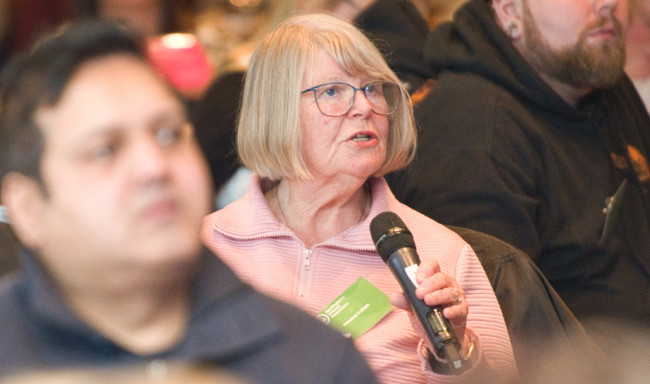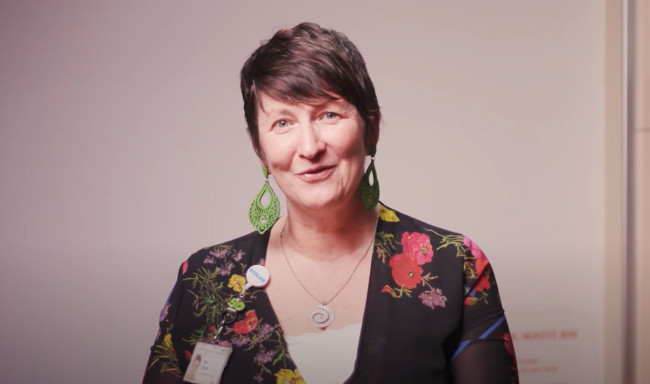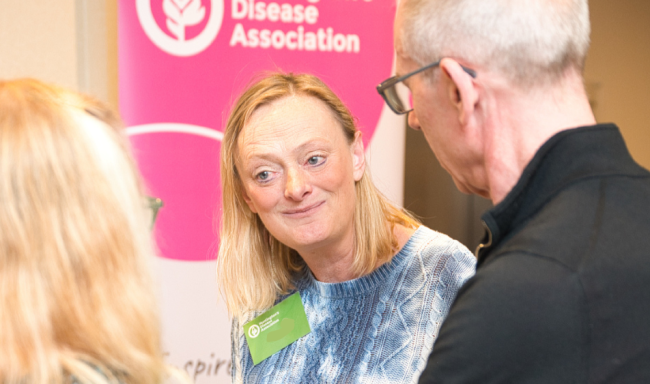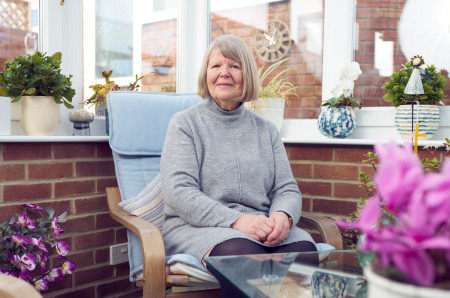Maureen shares her story of caring for generations of her family with Huntington's disease.
“I wish people knew and understood Huntington’s disease and the lack of care and the lack of compassion from some health care professionals. They need to listen to carers.”
Maureen, from Portsmouth, has been a carer for 44 years. In those 44 years she has cared for her husband, Edward, her daughter, Marie and her son, Peter, all of whom have died of Huntington’s disease. She now cares for her grandson, Alex, Marie’s son, who is now in the middle stages of the disease.
As well as caring for her family, Maureen also cares for the Huntington’s disease community. She was a founding member and is now the social secretary of the Hampshire and Isle of Wight branch. Maureen started the branch because she wanted to make everyone aware of Huntington’s.
“At that time, it was just four people trying to make a change and get people to listen to us.”
In the early years, the branch hosted an awareness day and met one family who had 22 people at risk. Seeing that ripple effect through families was a driving force for Maureen and the branch. As the branch grew, they hosted more fundraisers and began providing peer support and making special memories for Huntington’s families.
“In 2007 I met Eve, our local Specialist Adviser. Eve was the middleperson in connecting us with the charity. As the charity got bigger, Advisers were able to spend more time locally. Eve advocates for people in our area. She is also able to link to those who can't make the meetings but who still need support through information and welfare grants.”
Maureen’s early years
Maureen met Edward, known as Ed when she was 16 at a Catholic youth club. At 19, she was training to be a nurse – a career in which she says she was blessed to have started as she believes it gave her the knowledge to care for and advocate for her family in the way she did.
Ed worked away as a Marine Engineer. Maureen communicated via love letters while he was in the Merchant Navy. By her 21st birthday they were engaged. Once married they had their first child, Marie, in 1968.
After Ed’s father died, his side of the family were secretive about his death and would change the subject when it was brought up. “You shouldn’t have any more children Maureen,” Ed’s mother said to her. No explanation as to why, but never did Maureen think it was because her husband’s father died of a genetic condition that had been passed down to him.
Starting family life together, although they didn’t have much money, they made a happy home. Over the next ten years, their family grew and Maureen and Ed went on to have Anthony, Elizabeth, Peter and finally Hannah.
Huntington’s diagnosis
It was during her pregnancy with Hannah that Maureen first noticed a change in Ed. He had contracted a fever and had a possible fall. After repeated visits to the GP, Ed was diagnosed with a brain virus. But Maureen had noticed more changes, Ed was struggling with daily tasks such as time management and household jobs. It took a fall in work and losing his job for Maureen to realise something really wasn’t right.
“I knew this wasn’t a brain virus. I will never forget the psychiatrist telling me that I should push Ed harder for help with Hannah and around the home. Well that gave me the ammunition to get answers. I requested further tests for Ed as well as his late father’s medical records. His father’s death certificate read Huntington’s disease. His family wouldn’t talk about his father or his death. Why had they not told us?"
Ed found it really difficult being unemployed and it impacted him physically and mentally. Maureen was juggling looking after the family, educating the children and working.
It took four years to finally diagnose Ed. Not long after, his brother Bernard received the same diagnosis. Ed changed dramatically and Maureen states, “He was no longer the man I married—but I loved him until the end, always holding on to the memory of who he was before Huntington’s.”
Caring journey
Maureen cared for Ed for over 14 years in total with limited support. “You have to fight, I mean really fight to get the right care,” says Maureen. She managed his care single-handedly, often educating professionals who were unfamiliar with the realities of the disease.
“When we were offered some support, we requested a downstairs bath as he did not like showers and bathing was the only time that Ed was still. They didn’t listen to me even though as his wife and carer I know him best. Instead, they fitted a wetroom downstairs which Ed refused to use. Myself and Elizabeth had to carry him up and down the stairs most nights for a bath.”
As Ed deteriorated, caring for both Ed and the children became unsustainable. After some struggles, Ed was moved to hospital for a period of time. “It was a postcode lottery on beds in the hospital,” Maureen says. Once back home but following multiple chest infections, he was readmitted with a bowel blockage. Ed died in September 1995 at the age of 51, surrounded by his family. “I believe people would live longer and better if there was more and better support,” Maureen says.
In the end, it was Maureen, not healthcare professionals, who ensured Ed’s end-of-life care was dignified.
After Ed died, Maureen was left to raise five children and pay the mortgage. She had no choice but to keep going. “I’m not sure how I did it. You just put one foot in front of the other,” Maureen says. By then, she was also a grandmother. Her daughter Marie had given birth to Alex five years before Ed passed. When Marie was in her late twenties and Alex was just four years old, she began to show signs of Huntington’s.
For Marie, the disease presented differently to Ed. It caused psychosis. She hallucinated, saw people who weren’t there, and once left the hob on, filling her flat with gas. By the time Alex was nine, he was caring for his mother. Eventually, she was sectioned and spent several months in psychiatric care before moving into full-time care.
Meanwhile, her son Peter returned from university showing early signs of Huntington’s as well. Peter’s disease was more aggressive. He rapidly lost control of his body, the use of his legs and his speech - but he never complained. Marie died in 2013 at the age of 45. Eleven months later, Peter passed away too, aged 35.
"Caring for them was a privilege."
The last generation of Huntington’s
“Alex has seen it all and knows exactly what will happen, which is difficult,” Maureen says. Before his official diagnosis at 30, Maureen had suspected Alex had inherited the disease. But he lived life to the full. He is wobbly on his feet, can’t manage his money or appointments and has to be careful when eating. Although he lives independently, Maureen looks after him and takes him out, as well as getting him involved in the Hampshire branch activities.
“Huntington’s has devastated our family. My children grew up surrounded by Huntington’s but are kind and compassionate. We have made memories, we laugh, we find joy in the dark moments, and we have been surrounded by love, and that has been the foundation of our family.”
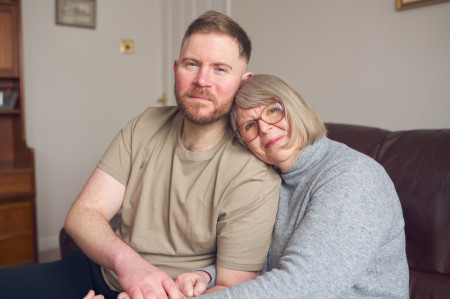
Acknowledgement for her caring
Over the past 44 years, Maureen has dedicated her life to caring for others and this was acknowledged by a regional award in 2024. Maureen was nominated and won the BBC Radio Solent Make a Difference Award.
“When I got the award, it said this is not about me, this is about raising awareness of Huntington’s disease.”
What you wish people knew
“Amongst the horror, there is so much joy - it’s about not giving in and persevering. I want professionals to get more training to support carers and families and so we can get more help for the Huntington’s community.”
Huntington's Disease Awareness Month 2025
This year's theme is Behind the Gene - The invisible challenges and untold stories of Huntington’s disease.
This May, we are showing the many faces and many lives behind Huntington's disease and what they wish people knew. Too often, people affected by Huntington's disease find themselves educating the public and healthcare professionals about their condition.
As part of this campaign, our aim is to educate more professionals about Huntington's disease. To do this we have created a new factsheet that is being distributed to GPs and health care settings across England and Wales.
Photo credit - Gareth Iwan Jones


